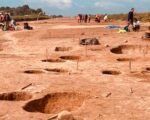In a sudden turn of events, approximately 500 trout have been left stranded in West Colorado Springs after a crucial water supply was unexpectedly shut off. The incident, which occurred on August 23, has prompted an urgent rescue operation to save the fish. The water supply cut has left the trout in perilous conditions, and local authorities, along with volunteers, are working tirelessly to relocate the fish to safer waters. This article delves into the details of the incident, the rescue efforts, and the broader implications for the local ecosystem.
The Incident and Immediate Response
The unexpected shutdown of the water supply in West Colorado Springs has had a dramatic impact on the local trout population. The water source, which is vital for maintaining the habitat of these fish, was cut off due to maintenance issues. As a result, the trout were left stranded in rapidly drying conditions, putting their survival at immediate risk. Local authorities were quick to respond, mobilizing resources and volunteers to address the crisis.
Volunteers from various community groups and environmental organizations have joined forces to rescue the stranded trout. Equipped with nets and buckets, they have been working around the clock to transfer the fish to nearby water bodies. The swift and coordinated response has been crucial in mitigating the impact of the water supply cut. However, the situation remains challenging, with the need for continuous monitoring and support to ensure the survival of the relocated trout.

The incident has also highlighted the importance of having contingency plans in place for such emergencies. Local authorities are now reviewing their protocols to prevent similar occurrences in the future. The community’s proactive involvement and the dedication of volunteers have been instrumental in managing the crisis, showcasing the power of collective action in the face of environmental challenges.
Environmental Impact and Concerns
The sudden disruption of the water supply has raised significant environmental concerns. The trout, which are an integral part of the local ecosystem, play a crucial role in maintaining the ecological balance. Their sudden displacement can have ripple effects on other species and the overall health of the water bodies. The incident underscores the delicate nature of aquatic ecosystems and the need for careful management of water resources.
In addition to the immediate threat to the trout, the water supply cut has also affected the surrounding flora and fauna. Aquatic plants and other organisms that rely on the water source are now facing stress due to the reduced water levels. This can lead to a decline in biodiversity and disrupt the natural processes that sustain the ecosystem. Environmentalists are calling for a thorough assessment of the impact and the implementation of measures to restore the affected habitats.
The incident has also sparked discussions about the broader implications of water management practices. With climate change and increasing human activities putting pressure on water resources, there is a growing need for sustainable and resilient water management strategies. Ensuring the availability of water for both human use and ecological needs is essential for the long-term health of the environment. This incident serves as a reminder of the interconnectedness of human and natural systems and the need for holistic approaches to resource management.
Future Measures and Community Involvement
Looking ahead, there is a strong emphasis on preventing similar incidents in the future. Local authorities are working on improving the infrastructure and maintenance of water supply systems to ensure reliability. Regular inspections and timely repairs are being prioritized to avoid unexpected shutdowns. Additionally, contingency plans are being developed to provide immediate responses in case of emergencies, minimizing the impact on the environment and the community.
Community involvement continues to be a key factor in addressing environmental challenges. The response to the trout rescue operation has demonstrated the power of collective action and the importance of community engagement. Local residents are encouraged to participate in conservation efforts and stay informed about environmental issues. Educational programs and awareness campaigns are being planned to foster a sense of responsibility and stewardship towards natural resources.
Moreover, collaboration with environmental organizations and experts is being strengthened to enhance the effectiveness of conservation initiatives. By leveraging the knowledge and expertise of various stakeholders, local authorities aim to develop comprehensive strategies for sustainable water management. The goal is to create a resilient and thriving ecosystem that can withstand future challenges and support both human and wildlife populations.
The incident in West Colorado Springs has highlighted the urgent need for effective water management and community involvement in conservation efforts. The swift response to rescue the stranded trout is a testament to the power of collective action and the importance of proactive measures. Moving forward, a focus on sustainable practices and resilient infrastructure will be crucial in safeguarding the environment and ensuring the well-being of all species.













